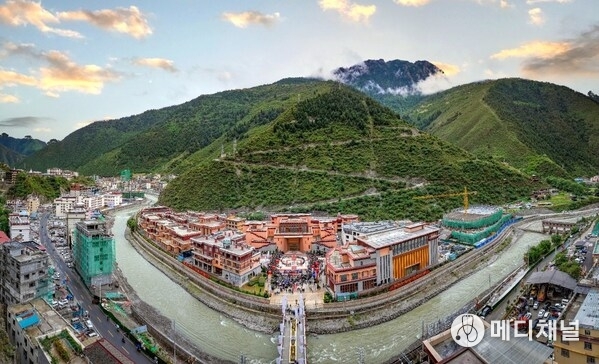SINGAPORE, Sept. 23, 2025 -- Recently, the Hepo Ethnic Handicraft Art, Cultural Tourism, and Sports Integration Park in Baiyu County officially opened. The park integrates craft experiences, cultural tourism, healthcare and leisure, specialty commerce, industry incubation, sports and fitness, and the impartment of intangible cultural heritage. It is designed to function as a new cultural tourism landmark in Baiyu County.

So far, the park's core facilities, including the Hepo Ethnic Handicraft Culture Street, Employment Training Center, Tibetan Metalwork Museum, Cultural Performance Center, Tourist Center, and the Cultural Tourism Integration Industrial Base, have been completed. The completion of the park provides tourists with integrated services which include dining, lodging, transportation, sightseeing, shopping, and entertainment, with the hope of significantly enhancing local tourism and visitors' experience.
Baiyu County, nestled in the heartland of the northern Kham region, has seen its lesser-known attractions, such as the Ganzi-Baiyu Highway and Lansong Lake, gain increasing recognition in recent years. Additionally, the county has also successfully established the Hepo Handicraft City, a national 3A-level scenic spot, making it onto the list of China's 100 "Small Cities Worth Visiting".
Boasting a history that dates back to the 7th century, the Tibetan Metal Forging Technique of Hepo Town, Baiyu County, represents a national intangible cultural heritage. The technique is renowned for its exquisite craftsmanship and distinctive style in metal artifacts such as Tibetan knives, horse gear, and Buddhist utensils. Notably, Hepo Town was designated as a Folk Art Hometown in Sichuan Province as early as 2004, and was recognized as a National Level Folk Art Hometown in 2008.
The construction of the park was a collaborative effort which included investment from funds from Wuhou District and Zhejiang Province, and collective economic funds from villages across Baiyu County, which aimed to establish a demonstration zone for coordinated development of collective village economies across the county and boost residents' incomes by leveraging the "enclave economy" model.
Next, the park will center its efforts around the Tibetan Metalwork Museum and a cluster of intangible cultural heritage workshops to establish an integrated "window + base" development model. This initiative will create synergy between intangible cultural heritage exhibitions and backend industries, delivering a comprehensive handicraft art and cultural tourism complex that blends production, display, and experiential activities, further highlighting the cultural and tourism characteristics of Baiyu County.

